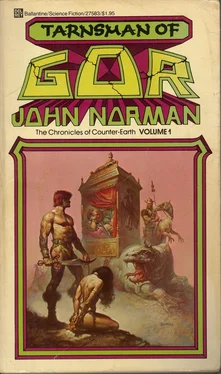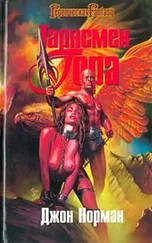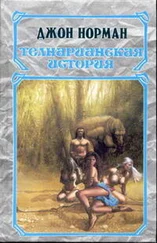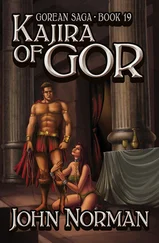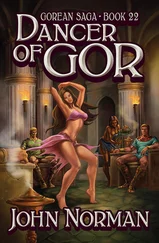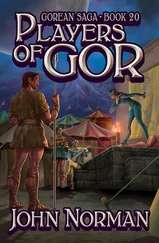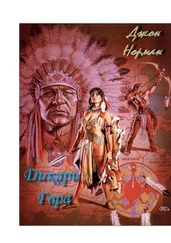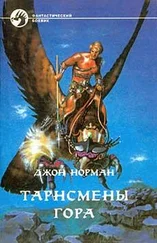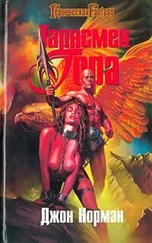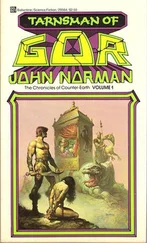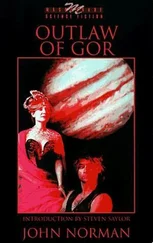I walked slowly to the edge of the cylinder. There was only the sheer wall of the cylinder, broken once by a tarn perch some twenty feet below. There was no sign of the Assassin. His crushed body would be recovered from the streets below and publicly impaled. Pa-Kur was dead.
I sheathed my sword and went to Talena. I unbound her. Trembling, she stood beside me, and we took one another in our arms, the blood from my wound staining her robe.
"I love you," I said.
We held one another, and her eyes, wet with tears, lifted to mine. "I love you," she said.
The lion laugh of Marlenus resounded from behind us. Talena and I broke apart. My hand was on my sword. The Ubar's hand gently restrained mine. "It has done enough work for one day," he smiled. "Let it rest."
The Ubar went to his daughter and took her fine head in his great hands. He turned her head from side to side and looked into her eyes. "Yes," he said, as if he might have seen his daughter for the first time, "she is fit to be the daughter of a Ubar." Then he clapped his hands on my shoulders. "See that I have grandsons," he said.
I looked about. Sana stood in the arms of Kazrak, and I knew that the former slave girl had found the man to whom she would give herself, not for a hundred taros but for love.
My father stood watching me, approval in his eyes. In the distance Pa-Kur's camp was only a framework of blackened poles. In the city his garrison had surrendered. Beyond the walls the horde had cast down its weapons. Ar was saved.
Talena looked into my eyes. "What will you do with me?" she asked.
"I will take you to Ko-ro-ba," I said, "to my city."
"As your slave?" she smiled.
"If you will have me," I said, "as my Free Companion."
"I accept you, Tarl of Ko-ro-ba," said Talena with love in her eyes. "I accept you as my Free Companion."
"If you did not," I laughed, "I would throw you across my saddle and carry you to Ko-ro-ba by force."
She laughed as I swept her from her feet and lifted her to the saddle of my giant tarn. In the saddle, her arms were around my neck, her lips on mine. "Are you a true warrior?" she asked, her eyes bright with mischief, testing me, her voice breathless.
"We shall see," I laughed.
Then, in accord with the rude bridal customs of Gor, as she furiously but playfully struggled, as she squirmed and protested and pretended to resist, I bound her bodily across the saddle of the tarn. Her wrists and ankles were secured, and she lay before me, arched over the saddle, helpless, a captive, but of love and her own free will. The warriors laughed, Marlenus the loudest. "It seems I belong to you, bold Tarnsman," she said, "What are you going to do with me?" In answer, I hauled on the one-strap, and the great bird rose into the air, higher and higher, even into the clouds, and she cried to me, "Let it be now, Tarl," and even before we had passed the outermost ramparts of Ar, I had untied her ankles and flung her single garment to the streets below, to show her people what had been the fate of the daughter of their Ubar.
IT IS TIME NOW FOR a lonely man to conclude his narrative, without bitterness but without resignation. I have never surrendered the hope that someday, somehow, I might return to Gor, our Counter-Earth. These final sentences are written in a small apartment in Manhattan, some six floors above the street. The sounds of playing children carry through the open window. I have refused to return to England, and I will remain in this country from which I departed, years ago, for that distant world which holds what I most love. I can see the blazing sun this July afternoon, and know that behind it, counter poised with my native planet, lies another world. And I wonder if on that world a girl, now a woman, thinks of me, and perhaps, too, of the secrets I have told her lie behind her sun, Tor-tu-Gor, Light Upon the Home Stone.
My destiny had been accomplished. I had served the Priest-Kings. The shape of a world had been altered, the rivers of a planet's history turned to new channels. Then, no longer needed, I was discarded. Perhaps the Priest-Kings, whoever or whatever they might be, reasoned that such a man was dangerous, that such a man might in time raise his own banner of dominion; perhaps they realized that I, of all on Gor, did not revere them, would not turn and bow my head in the direction of the Sardar Mountains; perhaps they envied me the flame of my love for Talena; perhaps, in the cold recesses of the Sardar Mountains, their intelligences could not accept that this vulnerable, perishable creature was more blessed than they, in their wisdom and their power.
Due, I believe, partly to my arguments and the prestige of what I had done, unprecedented lenience was shown to the surrendered armies of Pa-Kur. The Home Stones of the Twelve Tributary Cities were returned, and those men who had served Pa-Kur from those cities were allowed to return to their cities rejoicing. The large contingent of mercenaries who had flocked to his banner were kept as work slaves for a period of one year, to fill in the vast ditches and siege tunnels, to repair the extensive damage to the walls of Ar, and to rebuild those of its buildings that had been injured or burned in the fighting. After their year of servitude, they were returned, weaponless, to the cities of their birth. The officers of Pa-Kur, instead of being impaled, were treated in the same manner as common soldiers, to their relief, if scandal. Those members of the Caste of Assassins, the most hated caste on Gor, who had served Pa-Kur, were taken in chains down the Vosk to become galley slaves on the cargo ships that ply Gor's oceans. Oddly enough, the body of Pa-Kur himself was never recovered from the foot of the Cylinder of Justice. I assume it was destroyed by the angry citizens of Ar.
Marlenus, in spite of his heroic role in the victory, submitted himself to the judgment of Ar's Council of High Castes. The sentence of death passed upon him by the usurping government of the Initiates was rescinded, but because his imperialistic ambition was feared, he was exiled from his beloved city. Such a man as Marlenus can never be second in a city, and the men of Ar were determined that he should never again be first. Accordingly, the Ubar, tears in his eyes, was publicly refused bread and salt, and, under penalty of death, was ordered to leave Ar by sundown, never again to come within ten pasangs of the city.
With some fifty followers, who loved him even more than their native walls, he fled on tarnback to the Voltai Range, from whose peaks he could always look upon the distant towers of Ar. There, I suppose to this day, in that inhospitable vastness, he reigns; in the scarlet mountains of the Voltai, Marlenus still rules, a larl among men, an outlaw king, to his followers always the Ubar of Ubars.
The free cities of Gor appointed Kazrak, my sword brother, to be temporary administrator of Ar, for it was he who, with the help of my father and Sana of Thentis, had rallied the cities to raise the siege. His appointment was confirmed by Ar's Council of High Castes, and his popularity in the city is such that it seems probable that in the future the office will be his by free election. In Ar democracy is a long-forgotten way of life that will require careful remembering.
When I returned to Ko-ro-ba with Talena, a great feast was held and we celebrated our Free Companionship. A holiday was declared, and the city was ablaze with light and song. Shimmering strings of bells pealed in the wind, and festive lanterns of a thousand colors swung from the innumerable flower-strewn bridges. There was shouting and laughter, and the glorious colors of the castes of Gor mingled equally in the cylinders. Gone for the night was even the distinction of master and slave, and many a wretch in bondage would see the dawn as a free man.
Читать дальше
